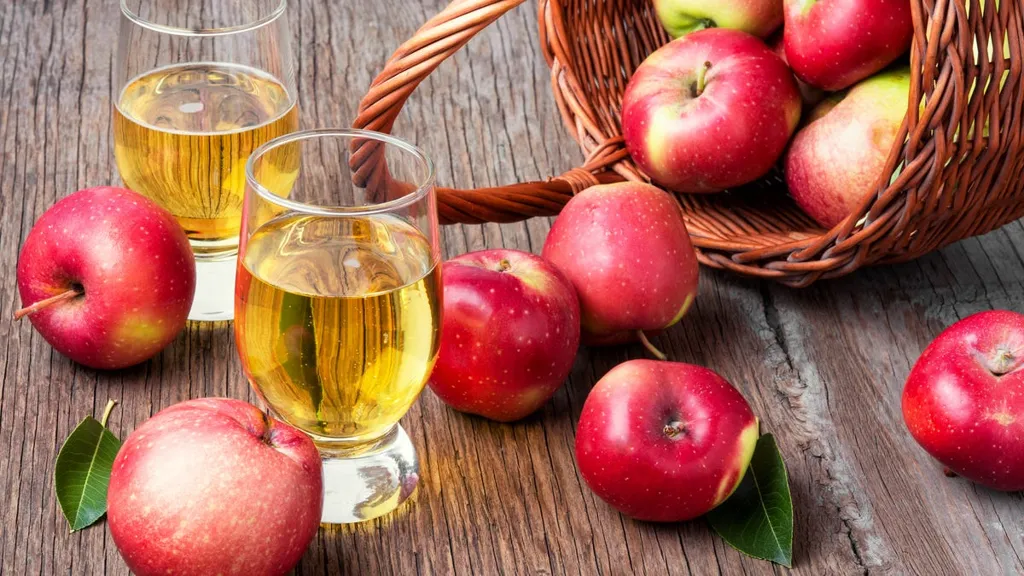Nutrition therapist Lauren Kelly explains what foods are designated as a "superfood" and how they can benefit your overall health goals.
With its sweet, crisp taste and refreshing flavor profile appealing to both children and adults, apple juice is a staple in many homes. From lunch boxes to hotel breakfast lounges, the beverage has wide enough appeal that one 2019 survey found that 69% of people rank apple juice as their favorite flavor of fruit juice.
But is that really a good thing? While the old saying goes that "an apple a day keeps the doctor away," that wisdom applies to the whole fruit - not its juicy counterpart.
What is apple juice?
Apple juice is simply the liquid extracted from pressed apples. After harvest (typically in the fall for Northern varieties), apples are washed, crushed and pressed. The juice is then filtered to remove any solids. Depending on how much pulp remains, the result is either a "clear" and crisper juice, or a "cloudy" version with more dietary fiber and plant compounds. With both varieties, pasteurization usually follows, "ensuring both food safety and an extended shelf life," says Caroline Susie, a registered dietitian and national spokesperson for the Academy of Nutrition and Dietetics.
As long as it's labeled 100% juice, "apple juice will have no added sugars, sweeteners or artificial ingredients," says Amy Goodson, a nutritionist and registered dietitian at The Sports Nutrition Playbook. "It may be from concentrate or fresh-pressed, but it's all derived from real apples." On the other hand, apple juice that doesn't have the 100% label "may be a juice blend or a juice cocktail that contains added sugars, high-fructose corn syrup, flavorings or other fruit juices to enhance taste, which reduces its nutritional quality," she explains.
Apple cider is a different beverage altogether. "It's typically unfiltered and may be raw or minimally processed, giving it a cloudier appearance and a shorter shelf life," says Lisa Young, a registered dietitian nutritionist, author of "Finally Full, Finally Slim" and adjunct professor of nutrition at New York University. Apple juice is also distinct from apple cider vinegar, which is fermented to produce acidity that's useful in cooking and for medicinal purposes. "Apple cider vinegar is sour and used more like a condiment than a drink," says Young.
Is apple juice good for you?
If you're choosing 100% juice, apple juice does offer some genuine health benefits. Studies show that small amounts may help improve cardiovascular markers like reduced oxidative stress, lower blood pressure and improved cholesterol levels.
Apple juice also contain antioxidants and polyphenols "which have beneficial effects that may further help support heart health and reduce inflammation," says Young. Plus, "drinking diluted apple juice can be helpful for rehydration and recovering from illness," she adds, which is why apple juice is commonly served in hospitals.
The pulp in cloudy versions of the juice "can be good for digestive health," says Susie. Apple juice also provides plenty of vitamin C and potassium, along with smaller amounts of other nutrients like iron, magnesium, folate and vitamin B6 - all "improving overall nutrient intake and supporting immune health," says Goodson.
Can you drink apple juice every day?
Despite such benefits, moderation is key. One 8-ounce glass of apple juice contains about 27 grams of sugar, which is comparable to the amount of sugar you'd get drinking the same quantity of soda. And unlike whole apples, apple juice lacks the fiber to slow glucose absorption. This "can cause a quick spike in blood sugar," which is especially concerning for people with prediabetes, diabetes or insulin resistance, says Young.
While 100% juice isn't directly tied to increased diabetes risk, portion control is still essential. And sugar-sweetened versions of the beverage are linked to higher risk, "so if you're living with diabetes or prediabetes, limiting consumption or pairing your apple juice with a protein or healthy fat can help prevent blood sugar spikes," says Susie. Children should also limit intake, not only due to high sugar content but also because of increased risk of dental cavities.
And at over 100 calories per 8-ounce drink, "overconsumption may contribute to weight gain if not balanced within a healthy diet," says Young.
Ultimately, "apple juice can be part of a healthy diet when consumed in moderation and ideally in 100% juice form without added sugars," says Goodson. "But it's still best balanced with whole fruits and other fiber-rich foods to support steady energy and long-term health."
